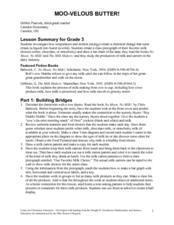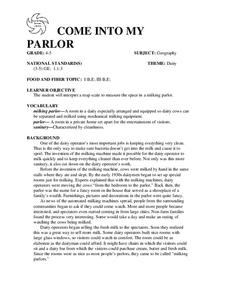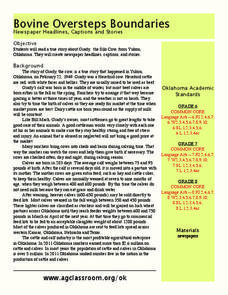Curated OER
Cow Printing
In this literacy worksheet, students practice the skill of printing to create a full sentence following the theme of the illustration that can be colored also.
Howard Hughes Medical Institute
Got Lactase? The Co-Evolution of Genes and Culture
Does the human body evolve as quickly as human culture? With a stellar 15-minute video, explore the trait of lactose intolerance. Only about 1/3 of human adults seem to still have the enzyme lactase and therefore, the ability to digest...
Curated OER
The Perfect Cow?
High schoolers examine how cattle have evolved through natural selection and selective breeding. In this natural selection lesson students compare and contrast natural and artificial selection.
Curated OER
The Gingerbread Man
First graders read a story from sentence strips and charts. Student pairs are called on to read their answer and move that strip to the top of the chart. One line of students moves down, giving each student a new partner. The activity...
Curated OER
Moo-Velous Butter!
Third graders investigate how temperature and motion (energy) create a chemical change that turns cream ( a liquid) into butter (a solid). They create a class pictograph of their favorite mils choices (white, chocolate, or strawberry)...
Curated OER
Make a Farm
After a class discussion about where their food comes from learners construct a farm from a print-out (embedded in the plan). They work in groups, and trace a food source from the beginning. For example, they discover how a farmer grows...
Curated OER
Where Does Food Come From?
Distinguish between food and non-food items. Recognize that food is obtained from both plant and animal sources. Identify sources for some common animal foods then construct a simple food path from the farm to the consumer.
EngageNY
End of Unit Assessment Parts 1 and 2: Evaluating Arguments and Claims
Which came first: the chicken or the egg? As part of the end-of-unit assessment for The Omnivore’s Dilemma, scholars watch a video about organic eggs versus conventional farm eggs. They use graphic organizers to collect evidence as they...
Curated OER
Bovine Oversteps Boundaries
Students listen to story of Grady, the Silo Cow, review vocabulary in story, look at newspaper headlines and discuss purpose of headlines, determine what makes a good headline, create three headlines of their own for story of Grady, and...
Curated OER
COME INTO MY PARLOR
Students interpret a map scale to measure the space in a milking parlor. They reveiw the process of using a map scale to calculate distances. Students are given worksheets, they read the information in the box together. They draw an...
Curated OER
Food Safety and Quality Assurance
Students identify and interpret how milk is processed and learn important concepts in food safety and quality assurance. They identify how milk is processed, the importance of food safety, and the quality assurance process. Students also...
Curated OER
4-H Dairy Activity Page; Ethical Decision Making
Get your 4-H farmers ready for their dairy project with this activity page, which focuses on helping students form ethical decisions. A variety of activities, including a scavenger hunt, a word search and viewing the anatomy of a dairy...
Curated OER
The Great Chicago Fire: Did Mrs. O'Leary's Cow Really Cause It?
Students research the Great Chicago Fire and its myths on how it started. They use their critical thinking skills to determine what really happened. They write an essay supporting their opinion on the fire.
Curated OER
Beef or Dairy?
Guernsey, Jersey, Holstein. Brangus, Charoloais, Herford. Here’s a truly cross-curricular resource that combines language arts, science, math, and visual arts activities as class members learn to distinguish between beef and dairy...
Curated OER
Bovine Oversteps Boundaries
Sixth graders read about Grady, the Silo Cow and analyze the parts of a news story. In this news article lesson, 6th graders discuss writing for different purposes. Students discover the characteristics of a strong headline. Students...
Curated OER
French Cheese
Students discover how cheese in France is made. Using the internet, they read articles about the importance of cheese in the French culture. They identify the various French cheeses and locate the areas in France that manufacture...
Curated OER
Farm Products Help Me Grow
Students view a display of empty food containers (or illustrations). They select a food and decide as a class if it has an animal or plant origin. Students view a display of common farm animals that are commonly eaten (cow, pig, chicken,...
Curated OER
The Fable of Franny And Her Fabulous Fainting Goat
Mix the art of reading comprehension with the skill of telling time. Children in grades two and three will discuss the importance of goats throughout history based on the provided background information. They'll create cute goat clocks...
Curated OER
WHAT ANIMALS GIVE US?
Students examine how animals on a farm provide us with many resources.
Curated OER
From Moo to You
Students listen to a story about cows and identify foods made from milk. They have a tasting party and practice a finger play called "Five Mugs of Milk."
Curated OER
THE FABLE OF THE FAINTING GOATS
Students practice telling time while reading a story about a fainting goat. They write their own story about a fainting goat. Students write letters to the International Fainting Goat Association, asking for more information about...
Curated OER
Bovine Oversteps Boundaries
Seventh graders read a newspaper account of "Grady the Silo Cow" and complete news-writing activities. In this news-writing lesson plan, 7th graders read the newspaper account about the cow. Students examine newspapers and work in groups...
Curated OER
Artificial selection
Students brainstorm a list of improvements they might make to a picture of a skinny cow to improve its milk yield. They draw ideas on the board and compare these pictures with the original and ask the students which cow they would use...
Curated OER
Animals
First graders study the basic needs of animals and compare them to human needs. They make bird feeders using milk carton and pine cones. They review the basic needs of food, water, air, and shelter and discuss what happens when animals...

























